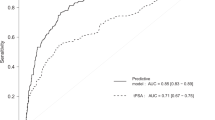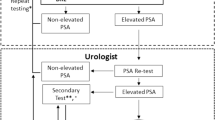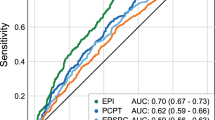Abstract
Prostate-specific antigen (PSA) has emerged as the most predictive test of whether or not a man has prostatic carcinoma. The free to total PSA ratio provides important enhancement in specificity, thus obviating unnecessary negative biopsies. In the absence of an international standard for total PSA, much less free PSA, variation between manufacturers may cause confusing results. We sought to compare three different manufacturer’s free and total PSA assays in a population consisting of consecutive patients who had PSA testing in a reference laboratory in Germany. Between April 1994 and July 1996, serum specimens from 240 men were evaluated with three different free and total PSA assays. Indications for PSA determination were based on the referring physician, who also provided the clinical diagnosis. Total and free PSA were measured on the same freeze–thaw cycle with Chiron Diagnostics, Enzymun Boehringer Mannheim, and Hybritech Tandem-R assays. Seventy-nine men had carcinoma of the prostate, 120 had clinical evidence of benign prostatic hyperplasia and 27 were without evidence of prostatic disease. The Chiron ACS: 180 free to total ratio compared very well with the Tandem-R assay at the 95% sensitivity level, affording 17 and 22% specificity respectively. Using the range of total PSA of 4–10 ng/ml, the increase in specificity of the free to total PSA is quite significant, and the specificity of the Enzymun assays is greatly improved. (Specificity of 49%, 29% and 25% at 95% sensitivity for ACS, Enzymun and Tandem respectively.) This data, based on ‘real world’ clinical experience, shows significant variation between different manufacturers’ assays. There was significant equivalence between the Chiron and Hybritech assays. The Enzymun assay performed well only when data from the total PSA range of 4–10 ng/ml was included. Clinicians must be aware of which manufacturers’ assays for both the free and total PSA their laboratory staff is utilizing, and laboratory technicians must provide meaningful outcome data based on the patient population they serve with respect to the performance of these assays.
This is a preview of subscription content, access via your institution
Access options
Subscribe to this journal
Receive 4 print issues and online access
$259.00 per year
only $64.75 per issue
Buy this article
- Purchase on Springer Link
- Instant access to full article PDF
Prices may be subject to local taxes which are calculated during checkout
Similar content being viewed by others
Author information
Authors and Affiliations
Rights and permissions
About this article
Cite this article
Roth, H., Stewart, S. & Brawer, M. A comparison of three free and total PSA assays. Prostate Cancer Prostatic Dis 1, 326–331 (1998). https://doi.org/10.1038/sj.pcan.4500264
Received:
Revised:
Accepted:
Published:
Issue Date:
DOI: https://doi.org/10.1038/sj.pcan.4500264



